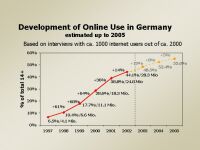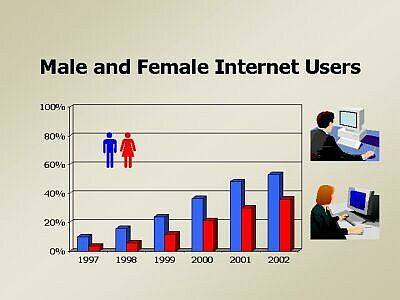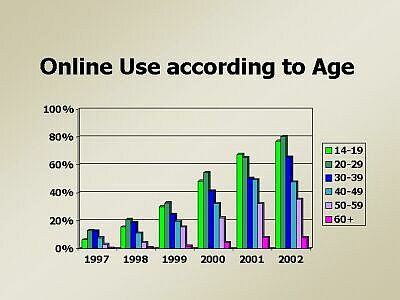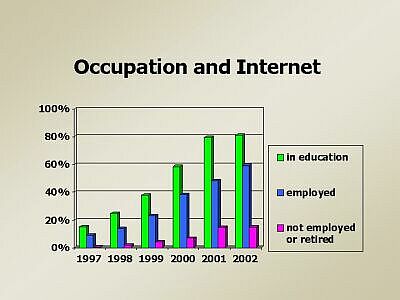 |
[TownStories] [gemeinsamlernen] [LiLL] | ||
|
|
||
| up - home | ||
|
|
German statistics | |
 |
||
Internet Use by Seniors in Germany
According to the ARD/ZDF Online Study 2002Presented at the EuCoNet Meeting Ulm 2002 by Erich Regula
Beginning from 1997 the German public TV stations ARD and ZDF performed a study of internet behaviour in the population of the Federal Republic of Germany.
The interviews were made in the second quarter of every year on a representative random sample of grown up online users in Germany beginning from the age of 14.
In 2002 2300 persons were interviewed by telephone (CATI = computer assisted telephone interviews). 1011 people out of them were "onliners". In the years before, too, the number of interviewed online users was slightly more than 1000.
The users were grouped according to age, sex, education, occupation and fields of interest and asked about their internet use.
In addition this investigation program was supplemented with a qualitative study: In three workshops with groups of 14 to 19, 25 to 49 and 50 to 65 years of age the participants discussed their behaviour in the net and the development of their user routines.
In the last 5 years the number of internet users in Germany increased sevenfold. In 1997 only 6.5 % or 4.1 Mio. of German grown ups were online. In early summer 2002 44.1 % or 28.3 millions are on the net with surfing, chatting, sending and receiving e-mails. However the rate of increase diminished from 61 to 64 % between 1997 and 2000 to 14 % from 2001 to 2002. Extrapolation of this curve gives about 55 % online users in 2005. See diagram 1.
Klick on the picture to extent it

Table 1 and 2 show the percentage and the calculated numbers of internet users according to sex, age and employment.
The interviews were made in the second quarter of every year on a representative random sample of grown up online users in Germany beginning from the age of 14.
In 2002 2300 persons were interviewed by telephone (CATI = computer assisted telephone interviews). 1011 people out of them were "onliners". In the years before, too, the number of interviewed online users was slightly more than 1000.
The users were grouped according to age, sex, education, occupation and fields of interest and asked about their internet use.
In addition this investigation program was supplemented with a qualitative study: In three workshops with groups of 14 to 19, 25 to 49 and 50 to 65 years of age the participants discussed their behaviour in the net and the development of their user routines.
In the last 5 years the number of internet users in Germany increased sevenfold. In 1997 only 6.5 % or 4.1 Mio. of German grown ups were online. In early summer 2002 44.1 % or 28.3 millions are on the net with surfing, chatting, sending and receiving e-mails. However the rate of increase diminished from 61 to 64 % between 1997 and 2000 to 14 % from 2001 to 2002. Extrapolation of this curve gives about 55 % online users in 2005. See diagram 1.

Table 1 and 2 show the percentage and the calculated numbers of internet users according to sex, age and employment.
Table 1: Percentage of online users in Germany according to groups of population
| total | 1997 | 1998 | 1999 | 2000 | 2001 | 2002 |
| total | 6.5 | 10.4 | ||||
| sex | ||||||
| male | 10.0 | 15.7 | 23.9 | 36.6 | 48.3 | 53.0 |
| female | 3.3 | 5.6 | 11.7 | 21.3 | 30.1 | 36.0 |
| years of age | ||||||
| 14-19 | 6.3 | 15.6 | 30.0 | 48.5 | 67.4 | 76.9 |
| 20-29 | 13.0 | 20.7 | 33.0 | 54.6 | 65.5 | 80.3 |
| 30-39 | 12.4 | 18.9 | 24.5 | 41.1 | 50.3 | 65.6 |
| 40-49 | 7.7 | 11.1 | 19.6 | 32.2 | 49.3 | 47.8 |
| 50-59 | 3.0 | 4.4 | 15.1 | 22.1 | 32.2 | 35.4 |
| 60+ | 0.2 | 0.8 | 1.9 | 4.4 | 8.1 | 7.8 |
| employment | ||||||
| in education | 15.1 | 24.7 | 37.9 | 58.5 | 79.4 | 81.1 |
| employed | 9.1 | 13.8 | 23.1 | 38.4 | 48.4 | 59.3 |
| not employed | 0.5 | 1.7 | 4.2 | 6.8 | 14.5 | 14.8 |
Table 2: Calculated numbers (in millions) of online users in Germany according to groups of population
| 1997 | 1998 | 1999 | 2000 | 2001 | 2002 | |
| total | 4.1 | 6.6 | 11.1 | 18.3 | 24.8 | 28.3 |
| sex | ||||||
| male | 3.0 | 4.8 | 7.2 | 11.1 | 14.7 | 16.2 |
| female | 1.1 | 1.9 | 3.9 | 7.1 | 10.1 | 12.1 |
| years of age | ||||||
| 14-19 | 0.3 | 0.7 | 1.4 | 2.4 | 3.3 | 3.8 |
| 20-29 | 1.3 | 1.9 | 2.9 | 4.6 | 5.5 | 6.5 |
| 30-39 | 1.4 | 2.2 | 2.9 | 5.0 | 6.1 | 7.9 |
| 40-49 | 0.7 | 1.1 | 2.0 | 3.3 | 5.2 | 5.2 |
| 50-59 | 0.3 | 0.5 | 1.6 | 2.2 | 3.2 | 3.5 |
| 60+ | 0.0 | 0.1 | 0.3 | 0.8 | 1.5 | 1.4 |
| employment | ||||||
| in education | 1.0 | 1.6 | 2.4 | 3.8 | 5.2 | 5.5 |
| employed | 3.0 | 4.6 | 7.7 | 12.8 | 16.1 | 18.9 |
| not employed | 0.1 | 0.4 | 1.0 | 1.6 | 3.5 | 3.7 |
In 1997 there were 10.0 % men and only 3.3 % women in the internet. In 2002 the ratio was 53 to 36 %. The reason is that in many jobs with high percentage of women, e.g. in office or laboratory, computer knowledge is indispensable. See diagram 2.

In 1997 the age groups 20-29 and 30-39 years had the highest proportion of online users (13.0 and 12.4%), followed by 40-49 (7.7%) and 14-19 (6.3%). The older groups had only 3.0% for 50-59 years and 0.2% for 60+.
In 2002 the group of 20-29 years had 80.3% internet users, followed by the teenagers with 76.9% and 30-39 years with 65.6. With increasing age the number of users goes down: 40-49 - 47.8%, 50-59 - 35.4%, 60+ only 7.8%, which is less than in 2001 (8.1%). See diagram 3.

All over the years the people in education (students and apprentices) had the highest rate of online users (2002: 81.1%), followed by employed ones (2002: 59.3%), whereas the people out of work or retired had only small rates - 14.8% in 2002, 14.5% in 2001. See diagram 4

The increase from 6.5%/4.1 Mio in 1997 to 44.1%/28.3 Mio in 2002 was much higher than foreseen in the 90s.
The rate of increase diminished from 61-68% between 1997-2000 to 14% during the last year.
The typical user in the middle of the 90s is male, 20-39 years of age and is at a high level of formal education.
In the 21st century the age groups under 20 and from 40-49 years of age discovered the internet in increasing numbers, as well as women, students and apprentices.
Very low rates and practically no increase is noticed with seniors and not employed or retired persons.
Reasons for Online Refusal:In 1997 the age groups 20-29 and 30-39 years had the highest proportion of online users (13.0 and 12.4%), followed by 40-49 (7.7%) and 14-19 (6.3%). The older groups had only 3.0% for 50-59 years and 0.2% for 60+.
In 2002 the group of 20-29 years had 80.3% internet users, followed by the teenagers with 76.9% and 30-39 years with 65.6. With increasing age the number of users goes down: 40-49 - 47.8%, 50-59 - 35.4%, 60+ only 7.8%, which is less than in 2001 (8.1%). See diagram 3.
All over the years the people in education (students and apprentices) had the highest rate of online users (2002: 81.1%), followed by employed ones (2002: 59.3%), whereas the people out of work or retired had only small rates - 14.8% in 2002, 14.5% in 2001. See diagram 4
Summary of Trends
Here the trends mentioned before are listed again:The increase from 6.5%/4.1 Mio in 1997 to 44.1%/28.3 Mio in 2002 was much higher than foreseen in the 90s.
The rate of increase diminished from 61-68% between 1997-2000 to 14% during the last year.
The typical user in the middle of the 90s is male, 20-39 years of age and is at a high level of formal education.
In the 21st century the age groups under 20 and from 40-49 years of age discovered the internet in increasing numbers, as well as women, students and apprentices.
Very low rates and practically no increase is noticed with seniors and not employed or retired persons.
- Lack of PC knowledge: The use of the net has become easier, but a certain knowledge of PC and software is still necessary. If older and especially retired persons have never used computers in their active life, the threshold to try PC use is high.
- Price: The prices of PCs and the rates of internet providers have gone down substantially since the 90s. In spite of this, we live in a period were consumers prefer to save their money.
- No advance against other media: Some people do not see, what better information they could get from the internet compared to newspapers, books, TV, radio. They think the advance is not worth the expense in money and time. Persons with classical education and frequent cultural activities often tend to this opinion.
What can we do to improve the acceptance of the internet by seniors?
The access could be made easier by simpler hard- and software.
Computer workshops and computer groups, preferably from seniors for seniors can be fairly effective.
There is a lot of websites with topics especially for seniors.
In Germany and especially in our part of the country there are a lot of initiatives for online education and information - from official institutions, from universities and from private communities - a part of them will be introduced to you in the following days
The access could be made easier by simpler hard- and software.
Computer workshops and computer groups, preferably from seniors for seniors can be fairly effective.
There is a lot of websites with topics especially for seniors.
In Germany and especially in our part of the country there are a lot of initiatives for online education and information - from official institutions, from universities and from private communities - a part of them will be introduced to you in the following days
Here is a listing of senior internet initiatives in Baden Württemberg
Homepage: www.senioren-internet-initiativen.de
Internet-Cafe Bonladen (Filderstadt)
Initiative Internet Point Filderstadt
Freiburger Internettreffs
Senioren-Internet-Cafe Geislingen
Seniorenakademie Heidenheim
Internetgruppe Hohentwiel/Singen
Senioren im Internet von Leinfelden-Echterdingen
Mannheimer Seniorenrat
Hobbykreis Mannheim
Bürgerinitiative "Senioren-Kultur", Mediendorf
Mönchweiler Seniorenakademie Pfinztal, Karlsruhe
Computeria Radolfzell (Bodensee)
Reutlinger Computer Oldies
Treffpunkt Internet Reutlingen (mit vier Standorten)
Computeria Rielasingen
Interessensgruppe Schondorf/Schwäbisch Gmünd
SeniorenNet Stuttgart
Zweite Lebenshälfte, Stuttgart
Hirsch-Begegnungsstätte Tübingen
Arbeitskreis Senioren und Internet (AK SENET), Ulm
Internet-Cafe im Altentreff Ulm/ Neu-Ulm
Senioren-Experten, Ulm
Senioren-Treff Internet und Computer des Altentreffs Ulm/Neu-Ulm (STIC)
Internetgruppe Bürgertreff Vaihingen
Offener Hobby PC-Kreis
50 plus Wiesloch
Überregionale Initiativen
Senioren Plattform Bodensee
Seniorentreff